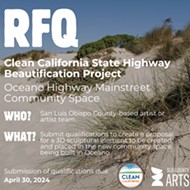'We put fear and prejudice on trial'
At Cal Poly, a staged reading of Dustin Lance Black's new play, 8, brings a groundbreaking marriage equality trial to the stage
By Anna Weltner[{
"name": "Ad - Medium Rectangle CC01 - 300x250",
"id": "AdMediumRectangleCC01300x250",
"class": "inlineCenter",
"insertPoint": "8",
"component": "2963441",
"requiredCountToDisplay": "12"
},{
"name": "Ad - Medium Rectangle LC01 - 300x250",
"id": "AdMediumRectangleCC01300x250",
"class": "inlineCenter",
"insertPoint": "18",
"component": "2963441",
"requiredCountToDisplay": "22"
},{
"name": "Ad - Medium Rectangle LC09 - 300x250",
"id": "AdMediumRectangleLC09300x250",
"class": "inlineCenter",
"insertPoint": "28",
"component": "3252660",
"requiredCountToDisplay": "32"
}]
A heated court trial is, in many ways, like a piece of theater. It’s a grand production with a hero and a villain, filled with heartfelt monologues and tense dialogue, delivered before a crowd of gasping onlookers. And no one knows exactly how it ends.
In the case of 8—Dustin Lance Black’s new play chronicling the pivotal trial in the Federal District Court’s handling of the effort to overturn California’s Proposition 8, the ban on gay marriage—that isn’t exactly the case. We know how this particular trial ends. What’s important is how we got there, and how far we still have to go.
Virginia Anderson, assistant professor of theater at Cal Poly, directs a dramatic reading of Black’s tense new play, which will run for one night only (Thursday, Oct. 18) at the Spanos Theatre. Starring both student and community actors, 8 represents a convergence of many local groups, including the Central Coast chapter of PFLAG, the Cal Poly Pride Center, and GALA, who’ve teamed up with Cal Poly’s Theatre and Dance Department and Liberal Arts and Engineering Studies program to stage the performance.
Black, whose previous works include the films Milk and J. Edgar, wrote 8 with help from transcripts from the historic Perry vs. Schwarzenegger trial (now called Perry vs. Brown), in addition to journalists’ reports and interviews he conducted with the plaintiffs and their families. Much of the dialogue is verbatim, fumbles and grammatical errors included, giving 8 an immediate and startlingly real quality.
The stars of 8 are many, but chief among them is Nicole Jameson as attorney David Boies, who represented the plaintiffs along with attorney Theodore B. Olson (Tom Ammon). A quick, well-spoken and cool-headed lawyer, Boies’ cross-examination of the defense’s witnesses Dr. William Tam (Gage Greenspan) and David Blankenhorn (Jenny Nelson) is lacerating and, in Blankenhorn’s case in particular, downright embarrassing for the defense. Jameson channels Boies’ knack for elegantly slicing through bullshit, her character’s respectful and deeply formal choice of words belied by an incredulous oh-no-you-didn’t look. Jameson’s Boies is a force to be reckoned with.
The same can be said of Ammon’s portrayal of Olson, a conservative attorney whose choice to represent opponents of Proposition 8 alongside Boies shocked many (Olson and Boies had been on opposing sides in Bush v. Gore). As Olson, Ammon is given significantly less stage time than Jameson—but makes powerful use of it, delivering arguments in a manner at once eloquent, intense, and unhurried. Ammon’s voice and authoritative presence bring to mind Jonathan Banks (best known as Breaking Bad’s Mike): One unimpressed look seems to shake the foundation of his opponents’ arguments.
The biggest of those opponents is Charles J. Cooper (Arash Shahabi), the attorney for the defense. As Cooper, Shahabi is significantly jumpier than Olson and Boies. Shahabi is also far younger, and one gets the impression that his character can’t yet match Olson or Boies’ mature, confident calm.
Like most Proposition 8 proponents, Cooper finds it easy to be vaguely lyrical about Traditional Family Values, yet difficult to produce concrete evidence. A particularly powerful moment occurs when Judge Vaughn R. Walker (Ian Tsuramuto) asks, “How exactly would same sex marriage harm heterosexual couples?” and the spluttering, frustrated Cooper eventually utters these three explosive little words: “I don’t know.”
Not a play to be bound by gender roles, 8 features several female actors playing male characters. Thankfully, these actors don’t try to convince you they’re men, which never seems to work. Rather, it seems, they let the spirit and mannerisms of their male characters inform their performance without weighing it down—a far more natural choice.
Where gender is crucial to the narrative, however, director Anderson sticks to the book. Liz Meyer and Cadence Mitchell are plaintiffs Kris Perry and Sandy Stier, a lesbian couple advocating for their right to marry. Plaintiffs Jeff Zarrillo and Paul Katami, a gay couple, are played by Douglas Simmons and CJ Gormley. Gina Whitaker is a standout as marriage equality opponent Maggie Gallagher.
The courtroom drama is occasionally broken up by “Yes on 8” ads, like the one where a little girl announces, “I learned how a prince married a prince, and how I can marry a princess!” to her mortified mother. Or the one in which an ominous voiceover challenges, “Gay marriage. Have you really thought about it? Have you thought about what it means?”
The ads, still so familiar, are a reminder of the immediacy of the issue in question—and it’s still very much in question. American audiences can attend a play about, say, the abolishment of slavery and leave feeling smug and comfortable about how much better, how much more enlightened, our society is today. 8 doesn’t permit any such self-congratulation. Its issues are still uncomfortably near the present. It’s a painful fact that the play’s final victory—the ruling of Proposition 8 as unconstitutional by the District Court—wouldn’t be met with cheers by many people in San Luis Obispo County. Moreover, the District Court’s ruling isn’t even close to the end of the debate, and neither was the 9th Circuit’s upholding of the ruling in February of this year. The issue of gay rights is still one embroiled in controversy, and this is what makes 8 such a brave, compelling, and important work.
Arts Editor Anna Weltner applauds bravery. Contact her at [email protected].












